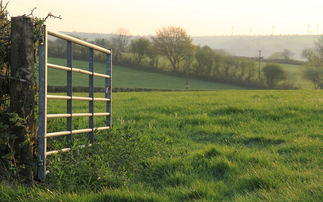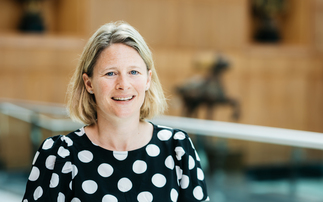Blue chips, universities, and shipping industry latest to call for bold Paris Agreement, as negotiations step up a gear
The second day of the Paris Climate Summit has got underway with reports a new negotiating text will be released by this weekend.
BusinessGreen understand the two diplomats steering the negotiations, Algeria's Ahmed Djoghlaf and the US' Dan Reifsnyder, are planning to publish a new text by Friday. The French hosts will then decide the next steps by Monday when the high level summit opens. The co-chairs said failure to complete the bulk of the technical negotiations by the first weekend of the summit could prove a "recipe for disaster" for the fortnight of talks.
UN climate summits typically aim to deliver a slimmed down negotiating text ahead of the second week, when Ministers arrive to finalise any outstanding details. However, delays and blocking tactics by some delegations have often resulted in Ministers arriving for the second week to find numerous issues unresolved, leading to late nights and lengthy over-runs as the negotiations proceed.
The chairs are hoping to avoid the slow progress that has hampered previous summits. But the most recent attempt by Djoghlaf and Reifsnyder to slim down the negotiating text ahead of the final Bonn round of talks was rejected by the G77 group of developing nations, culminating in the text swelling again from 20 to over 50 pages.
Negotiators will now spend the next few days in a series of working groups, as they attempt to slim down the text and tackle some of the technical issues that have led to large numbers of square brackets and different options remaining in the text. Diplomats are working on three negotiating approaches, UK government sources say. The first of these are Open Ended Contact groups, which aim to weave together the range of topics up for discussion. Another approach sees 10 to 20 co-facilitators leading discussions on specific issues. These talks have already started going late into the night, with the latest talks last night ending around midnight.
Finally, dozens of small groups of countries are holding so-called "informal-informal" discussions, where they are aiming to find consensus on key paragraphs in the text.
The first day of the summit was dominated by world leaders' underlining their commitment to delivering an ambitious deal, but it also highlighted some of the challenges diplomats will have to overcome as they attempt to streamline the text.
A number of emerging economies including China and India are set to oppose the use of the word "decarbonisation" in the text. India's delegation yesterday reiterated its opposition to any measures that may limit its freedom to expand its coal industry, with energy minister Piyush Goyal telling reporters India needs base load power to support its economic development and renewable energy roll out. "We don't have gas so obviously the base load will have to be coal to provide 24/7 power," he said.
Observers fear India's desire to protect its coal industry could see the country oppose proposals for a stronger system of emissions reporting and a mechanism of reviewing emissions pledges every five years, which some developing countries believe could act as a forerunner for binding emissions targets.
Climate Home reported that Nicaragua has become the first country to refuse to submit a national climate action plan, known as an INDC in the UN jargon, arguing the system of voluntary plans represented a "path to failure".
Over 180 of the 193 countries in attendance in Paris have now submitted climate action plans, fuelling hopes the system of INDCs will mobilise billions of dollars in clean tech investment and move the world closer to a pathway where temperature increases are limited to 2C.
However, Nicaragua's lead envoy Paul Oquist told Climate Home that the system of voluntary pledges would not deliver deep enough emissions reductions. "We don't want to be an accomplice to taking the world to 3 to 4 degrees and the death and destruction that represents," he said.
A number of other nations are known to be deeply sceptical about the legal basis for the INDCs and the scale of ambition contained in the voluntary national emissions pledges.
Today will see US President Barack Obama meet with leaders of island states in an attempt to address some of the concerns held by the group of most vulnerable countries, which yesterday called for any agreement to aim to limit warning to 1.5C, rather than the previously agreed 2C goal.
Speaking to the main conference hall yesterday, Obama confirmed the US would mobilise more funding to help the most vulnerable nations adapt to climate change and enable new insurance-based policies.
Today the White House confirmed it would invest $30m for climate risk insurance initiatives in the Pacific, Central America, and Africa.
"We know the truth that many nations have contributed little to climate change but will be the first to feel its most destructive effects," he said. "For some, particularly island nations - whose leaders I'll meet with tomorrow - climate change is a threat to their very existence. And that's why today, in concert with other nations, America confirms our strong and ongoing commitment to the Least Developed Countries Fund. And tomorrow, we'll pledge new contributions to risk insurance initiatives that help vulnerable populations rebuild stronger after climate-related disasters."
The US funding commitments followed a raft of new climate funding and forest protection initiatives, which saw the summit kick off with reassurances from industrialised nations that they will mobilise investment to help poorer nations tackle climate change.
Meanwhile, the raft of business groups calling for officials in Paris to deliver an ambitious agreement expanded further today.
The Low Carbon USA group, which includes over 100 leading blue chips, today took out an advert in the Wall Street Journal, calling on the US government to "seek a strong and fair global climate deal in Paris that provides long-term direction and periodic strengthening to keep global temperature rise below 2C".
The group, which includes Intel, Nike, Hilton, Kellog's, and NRG, argued a strong Paris deal would benefit the US economy. "We want this economy to be energy efficient and low carbon," they said. "We believe there are cost-effective and innovative solutions that can help us achieve that objective. Failure to tackle climate change could put America's economic prosperity at risk. But the right action now would create jobs and boost competitiveness."
In addition, the International Chamber of Shipping today announced it "fully supports" a global deal on climate change. The group argued an agreement in Paris should allow the International Maritime Organisation (IMO) to continue with its efforts to drive emissions reductions across the industry.
Some green campaigners have accused the IMO of making slow progress in addressing climate change risks, arguing any Paris agreement should include specific measures for tackling shipping emissions.
But speaking at a special shipping event at the Pompidou Centre in Paris, ICS Secretary General, Peter Hinchliffe, insisted the industry was making rapid progress in tackling its emissions. "Mandatory regulations already adopted by IMO will ensure that all ships built after 2025 will be at least 30 per cent more efficient than ships operating today," he said. "Combined with further technical and operational measures plus new technology, international shipping should be able to reduce its CO2 per tonne-kilometre by 50 per cent before 2050."
Meanwhile, a global alliance of universities and colleges today published an open letter calling on negotiators at COP21 to recognise the crucial role higher education bodies can play in tackling climate change.
The group, which is backed by more than 10,000 institutions worldwide, urged ministers and negotiators to "acknowledge and strengthen the research and education role that universities and colleges play in finding and implementing solutions towards climate change mitigation and adaptation, placing it in the context of addressing wider issues of sustainability, including social and economic policies and practices".
The letter also puts forward a number of recommendations, including showcasing universities and colleges as "living laboratories for climate change adaptation and mitigation", increasing support for transdisciplinary learning, teaching and research approaches and utilising university and college campuses to accelerate the transition to clean energy sources.
This article is part of BusinessGreen's Road to Paris hub, hosted in association with PwC.








